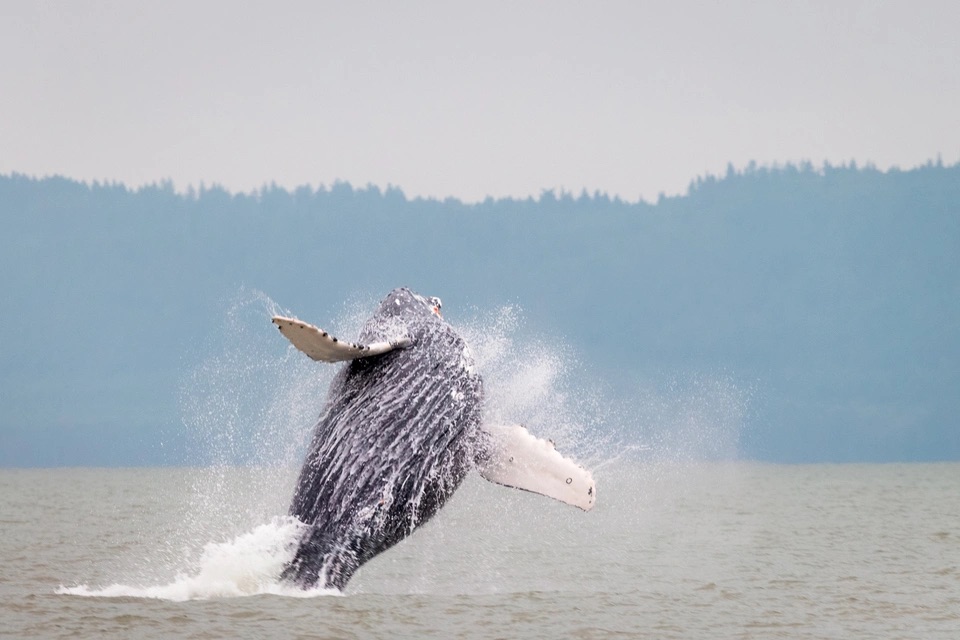Every summer, humpback whales return to the cool, rich waters of the Salish Sea, capturing the hearts of whale watchers with their massive tails (called flukes), towering spouts, and—if you're lucky—a jaw-dropping breach. These whales are among the most frequently sighted on Seabreeze tours, and their presence is always a highlight for guests and naturalists alike.
🌎 Human Impacts on Humpbacks
Humpbacks are highly migratory, swimming thousands of kilometres each year, and with that epic journey comes risk. The biggest threats they face are human-caused, and many are preventable:
⚓ Entanglement in Fishing Gear
Humpbacks can become entangled in fishing lines, nets, and crab gear, especially ghost gear—lost or discarded fishing equipment left drifting at sea. These entanglements can restrict movement, cause injuries, or lead to starvation and death if not addressed.
🚤 Vessel Strikes
With more vessels sharing the water, collisions are becoming increasingly common. Humpbacks often rest, feed, or dive for long periods, which can make them difficult to see, especially if boats are traveling too fast or not paying attention.
🔊 Noise Pollution
Whales rely on sound to communicate, navigate, and feed. Underwater noise from ships, sonar, and marine construction can disrupt these vital behaviours, making it harder for whales to locate food or communicate with their calves and other whales.
💙 What YOU Can Do to Help
Humpbacks need healthy, quiet oceans to thrive. And the good news is, we all play a role in their protection. Here are a few simple actions you can take:
✔️ Slow Down on the Water
If you’re boating in known whale habitat (like the Salish Sea), slow your speed and stay alert for blows, flukes, or surface activity. Use the WhaleReport app in BC waters to report sightings and receive alerts about nearby whales.
✔️ Choose Sustainable Seafood
Support fisheries that use low-impact gear to reduce bycatch and ghost gear. Look for certifications like Ocean Wise or MSC Certified when buying seafood.
✔️ Report Entanglements
If you see a whale in distress or entangled, report it immediately to local marine rescue networks. In British Columbia, contact the DFO Marine Mammal Response Program at 1-800-465-4336.
✔️ Support Marine Conservation Groups
Many organizations work tirelessly to clean up ghost gear, study humpback populations, and advocate for quieter, safer oceans. Donating or volunteering can make a big difference.
🛥️ What We Do at Seabreeze Adventures
At Seabreeze, we believe ethical wildlife viewing is critical to conservation. Here’s how we minimize our impact:
- We follow all marine mammal viewing regulations, maintaining appropriate distances and reducing speed around whales.
- Our captains and naturalists are trained to identify humpback behaviours and avoid interference.
- We educate every guest onboard about the marine ecosystem, responsible wildlife viewing, and how their choices matter.
Seeing a humpback in the wild is not just exciting—it’s a reminder of what we’re protecting.
📸 Humpback Sightings: A Guest Favourite
No two humpback encounters are the same. Some days it’s a peaceful dive, fluke raised high. Other days it’s a full breach, sending spray into the sky. Our naturalists are always ready to share the story behind each whale—many are known individuals who return year after year.
Every fluke tells a story, and when you join us on the water, you become part of that story, too.
📍 Tours depart daily from Steveston, BC
🎟️ Book your 2025 tour today at seabreezeadventures.ca
🛥️ All sightings follow Canadian marine mammal regulations. Wildlife photos are captured by trained naturalists using telephoto lenses and cropped to ensure respectful distances.



